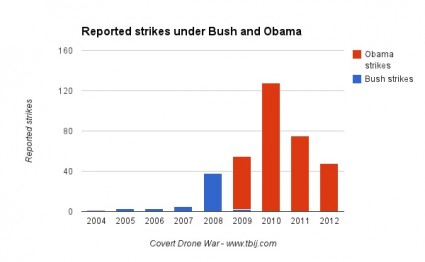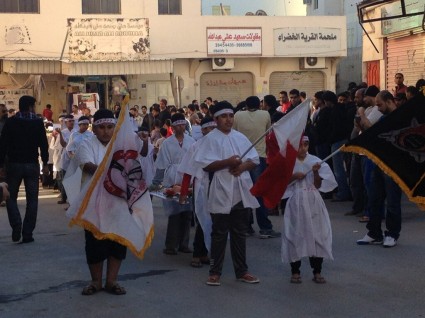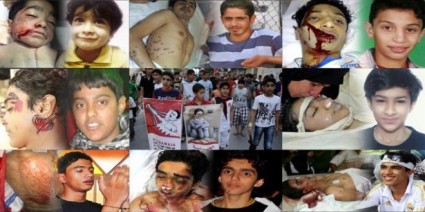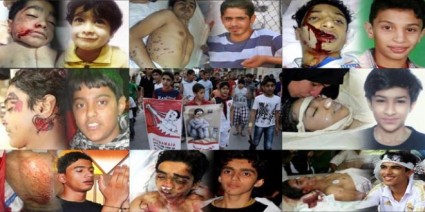Road to No Where
“Given the fact that the government is effectively an outgrowth of the ruling family in Bahrain, any dialogue without their involvement will be meaningless fiddling around the edges.”
Bahrain talks off to shaky start
BBC – 5 February, 2013
Wefaq leader Sheikh Ali Salman leads protest march Jan 2013 The national dialogue aims at ending two years of protest and unrest in Bahrain
Talks aimed at resolving political unrest in the Gulf island kingdom of Bahrain look set to get off to an uncertain start.
The six opposition societies have agreed to meet with other groups on Sunday in a bid to end nearly two years of unrest.
The country’s justice minister has said he will serve as a moderator and government representative.
But the main opposition party al-Wefaq has already voiced grave doubts about a positive outcome.
Khalil al-Marzook, a senior member of the party told the BBC the ruling family was risking “dragging the country into an ambush of more sectarianism”.
Bahrain has a Shia Muslim majority population ruled by a Sunni royal family. Shia have long complained of marginalization and discrimination.
Mr Marzook added: “They (the royal family) have the mindset of playing games rather than solving problems. It is time wasting and it is not in the interests of the country.”
Frustration
Part of the opposition’s frustration has to do with the refusal of the government to enter directly into negotiations aimed at ending an impasse that has severely damaged the economy and polarized the country.
In response to a question from the BBC about what role the government would play, a spokesperson replied: “Representatives of the government’s ministries will be present at the dialogue to oversee and make suggestions if needed, but will not be there to take part in the dialogue itself.”
But that statement and others like it have left observers, the opposition and even some government insiders scratching their heads.
Kristian Coates-Ulrichsen is an expert on Gulf politics and a research fellow at the London School of Economics. He believes that unless the government sits down and is prepared to work with the opposition on moving toward compromise, the talks will fail.
Crown Prince Salman al-Khalifa (30 January 2013) The opposition has called for Crown Prince Salman to join talks aimed at ending nearly two years of unrest
“Given the fact that the government is effectively an outgrowth of the ruling family in Bahrain, any dialogue without their involvement will be meaningless fiddling around the edges.”
Reformers and hardliners
The leader of al-Wefaq, Sheikh Ali Salman had called for the Bahraini Crown Prince Salman al-Khalifa to attend the talks but that is not likely to happen.
The crown prince is seen as a reformist in a court divided on how to respond to opposition demands.
Hardliners – centred around the appointed Prime Minister Sheikh Khalifa bin Salman al-Khalifa, who has been in his post since 1971 – are said to be opposed to the dialogue.
They fear that any concessions will only serve to encourage more demands from opposition leaders they deeply distrust.
On Wednesday against a backdrop of mutual suspicion, Sheik Salman flys to Moscow at the invitation of the Russian foreign ministry in a bid to bring pressure to bear on the ruling family.
“We are encouraging the international community to urge the al Khalifas to bring credibility, not more manoeuvres to the dialogue process,” Mr Marzook told the BBC.
The move, which caught some observers by surprise, may be part of a wider Russian initiative to improve an image that has been damaged by its stand on the Syria crisis.
“We’ve been asking for a meeting [with Russian officials] since July of last year,” Mr Marzook said, “but we just got the invitation on Sunday.”
This was the same day the Bahraini justice minister offered to renew a dialogue with the opposition. …source
February 5, 2013 No Comments
Artist Malina Suliman Wakes Up Afghanistan
Malina Suliman: The Graffiti Artist Waking Up Afghanistan
Reuters – Al Arabiya

Charred bodies lie scattered against blood-stained walls and debris covers the ground. The unusual thing in this gruesome scene is that the “blood” is red paint, and part of an art installation.
It’s a work by 23-year-old Afghan artist Malina Suliman. She risks her life, Suliman says, sometimes working by flashlight after dark, to create art in southern Kandahar province, still one of the most dangerous areas in the country.
Her pieces, which range from conceptual art to paintings and sculpture, are bold representations of the problems facing her generation.
“Many people had never seen an art installation,” Suliman said of “War and Chaos,” her exhibit last year, which depicts the aftermath of a suicide bombing, a not uncommon event in Kandahar.
“Some were offended and others were hurt because they’d experienced it before.”
Her pieces earned her an invitation last year to visit the Kabul palace of President Hamid Karzai, who is also from Kandahar, where she showed him her art.
Suliman’s work is now making waves in the Afghan capital, where she lived as a child after fleeing the violence of her native province. She had two Kabul exhibitions in December, a highlight of which was a sculpture of a woman in baggy clothing with a noose tied around her neck.
…more
February 5, 2013 No Comments
Child Murder becomes routine for US Drone Commander and Chief
The Children Killed by America’s Drones. “Crimes Against Humanity” committed by Barack H. Obama.
By Michel Chossudovsky – Global Research – 26 January, 2013
This is a list of names of innocent children killed by America’s drones
But behind each name there is the face of a child with a family history in a village in a far away country, with a mom and a dad, with brothers and sisters and friends.
Among the list, are infants of 1, 2, 3 and 4 years old.
In some cases brothers and sisters of an entire family are killed.
Four sisters of the Ali Mohammed Nasser family in Yemen were killed. Afrah was 9 years old when she and her three younger sisters Zayda (7 years old) , Hoda (5 years old) and Sheika (4 years old) were struck by an American drone.
Ibrahim, a 13 year old boy of the Abdullah Mokbel Salem Louqye family in Yemen was struck by a US drone, together with his younger brother Asmaa (9 years old) and two younger sisters, Salma (4 years old) and Fatima (3 years old)
These children are innocent. They are not different from our own children.
Their lives were taken away at a very young age as part of a military agenda, which claims to be combating “international terrorism”
These drone attacks are extremely precise. We are not dealing with “collateral damage”.
Drone operators have the ability of viewing from a computer screen their targets well in advance of a strike.
A family home is referred to as a “structure” or a “building” rather than a house. When they target a home with family members, they kill children. And they know that in advance of the drone strike:
“Bryant saw a flash on the screen: the explosion. Parts of the building collapsed. The child had disappeared. Bryant had a sick feeling in his stomach.
“Did we just kill a kid?” he asked the man sitting next to him.
“Yeah, I guess that was a kid,” the pilot replied.
“Was that a kid?” they wrote into a chat window on the monitor.” (The Woes of an American Drone Operator, Spiegel.de, December 14, 2012)
These children were killed on the orders of the US President and Commander in Chief Barack H. Obama.
The commander in chief sets the military agenda and authorizes these killings to proceed.
The killings were quite deliberate. They are categorized as “crimes against humanity” under international law.
Those who ordered these drone killings, including the president of the United States, are war criminals under international law and must be indicted and prosecuted
It should be noted that the drone attacks on civilians have increased dramatically during the Obama presidency:
February 5, 2013 No Comments
Bahrain Kids Protest Security Force Murders of Infants, their Siblings and Friends
February 5, 2013 No Comments
Extereme Sentences for Dissent in Saudi Arabia parallel those in Bahrain
Saudi Arabia: 36 Days in Jail for Human Rights Sign
31 January, 2013 – FARS
TEHRAN (FNA)- Saudi Arabia’s harsh crackdown on demonstrations led many to start experimenting with new methods for showing dissent.
A public hunger strike was one example. In a series of tweets, Saudi Twitter user Mohammad al-Olayan told his own story of writing a human rights sign, namely “No to arbitrary detainment,” on his car, Global voices reported.
“On Sunday December 16th, I was arrested by emergency forces on my way back from work because of a “No to arbitrary detainment” sign on my car’s rear glass. I was transferred to al-Manar police (station) after my car had been photographed,” al-Olayan said on Twitter.
“A policeman started the interrogation and I denied responsibility. I told them that I had found the writing at dawn when I was about to leave to work and I couldn’t remove it because the ink was irremovable. I affirmed my statements with a fingerprint and I asked the policeman to allow me to leave even if this requires a third person since I did not commit any crime and did not violate any law, but he refused and told me that I am under detainment for interrogation.
“Then a policeman asked me to hand my mobile phone and my keys and took me to a very, very crowded communal cell with inhumane conditions. The policemen told me (to stop talking about humanity and get in,) but I refused to do so. He then took me to a solitary confinement cell, but it was leaking and full of dirt so I refused to get in so he took me to a hallway and said that no place left but this one I told him that this was a better place, so he tied me to an iron door then they took me to the communal cell at dawn (…)”
Al-Olayan continued by reporting further interrogation in which he was asked whether he had attended the public trial of two of Saudi Political and Civil Rights Association’s (ACPRA) co-founders. ACPRA found out about his arrest so they asked a volunteer lawyer to help him.
Al-Olayan was finally sent to court and he continued to deny responsibility. The judge issued an order to release him, after 36 days, on the condition of attending further sessions if he was ever called. …source
February 5, 2013 No Comments
Celebration for release of unjustly detained Aqil Abdul Mohsen
February 5, 2013 No Comments
Renewed Calls for Bahrain Regime to lift Ban and Stop Attacking Peaceful Potest
Bahrain: the regime must halt the persistent security repression to the peaceful demonstrations
ANHRI – 2 February, 2013
The Arabic Network for Human Rights Information (ANHRI), denounces today the use of the excessive force in dealing with the peaceful demonstrations that took place in several places in Bahrain to call for political and social reforms in the country and to solidarity with the detainees.
Bahrain security forces used the tear gas bombs and shut gun to deal with the peaceful demonstrations which took place in Friday February 1, to call for political reformations in addition to assure the continuation of the popular movement and persistence on the demands of the Bahrain revolution which will have its third anniversary after days. The security forces repressed the demonstrations which took place in Akr, Kranah, Gamarah, Sadd and Gad Hafs, which resulted in several injuries among the demonstrators and the news reported regarding the arrest of demonstrators.
The opposition forces announced series of protesting in conjunction with the second anniversary ofthe Bahraini uprising on February 14, 2011. The events include people’s demonstrations, celeberations and marches in differnet areas which include “Manama” which entitled “calls for the revolution”, which will start in the first of February 2013 until 16 February, it also included 48 of revolutionary events, marches and opposition movements to assure the presistence of the revolution in Bahrain and call for the democractic transformation such as the masses marches, which entitled differnetly, and people meetings, protests and marches in the heart of Manama.
ANHRI said that “the persistence of using excessive violence by the authorities to address the peaceful demonstrations of the people and prosecuting the activists, oppositions and harassing them, are attempts from the regime to infanticide the popular movement which calls for freedom and democracy”.
ANHRI said that “the persistence of the repressive policies of the regime, will end any attempt to negotiate and discussion between the opposition and the regime”.
ANHRI calls on Bahrain to respect the freedom of expression and peaceful demonstration which are legitimate to the individuals and citizens and garunteed by all the international treaties and charters. …source
February 5, 2013 No Comments
Bahrain Two Years On – King’s Chardes, Shenanigans and Pretense of “Reform” Sharpen the call to Revolution
Bahrain’s 2-year-old uprising at crossroads: Offers to talk and calls for greater rebellion
By Associated Press – 4 February, 2013 – Washington Post
MANAMA, Bahrain — Young men wearing masks lurk in the darkened alcoves of the old market in Bahrain’s capital. “To victory,” they whisper as they hand out pamphlets calling for greater rebellion after two years of nonstop unrest in the Gulf kingdom.
In another part of the city, leaders of established Shiite opposition groups study their next moves. One option is to open talks with the Sunni monarchy as a possible soft landing from the Arab Spring’s longest-running uprising against a sitting power.
The two faces of Bahrain’s tumult have never been clearer as the struggles in the strategic island — home to the U.S. Navy’s 5th Fleet— mark their second year next week.
The old guard Shiite political factions appear worn down by the ceaseless tensions and seem increasingly open to some kind of face-saving compromise with Bahrain’s Sunni leadership. Such negotiations are endorsed by Washington and other Western allies of Bahrain’s ruling dynasty.
On Monday, Bahrain’s justice minister, Khaled bin Ali Al Khalifa, said preliminary political talks are scheduled to begin Feb. 10 — just days before the second anniversary of the crisis. The official Bahrain News Agency called it an important step toward “national consensus.”
But the clashes and bloodshed also have elevated another voice from Bahrain’s streets: A shadowy network of youth groups and hard-line Shiites — knitted together by social media — that have coalesced around an angry axis. Calls to bring down the monarchy are now staples in the near daily skirmishes with security forces.
“No to dialogue! No to surrender!” several hundred protesters chanted during a recent confrontation between demonstrators with firebombs and riot police responding with tear gas and stun grenades.
It might seem like a worrisome groundswell for Bahrain’s Sunni rulers, who have managed to keep a close grip on power for decades under what critics call a two-tier system. The majority Shiites, about 70 percent of the population, claim they are relegated to the lower rungs with limited say in the country’s affairs.
Bahrain’s uprising seeks to tilt the scales toward the Shiites. But divides within the Shiite population — whether to battle harder or open talks — could end up giving Bahrain’s rulers more breathing space. If the main Shiite factions can be brought into negotiations, the opposition left on the streets would continue as an annoyance to the monarchy but less of a potential threat to their power.
“The confrontational elements in Bahrain — those who have effectively rejected dialogue as pointless — are certainty taking more charge of the tone on the streets,” said Toby Jones, an expert on Bahraini affairs at Rutgers University. “It invites a type of comparison to the 50s and 60s civil rights movement when activists had to be provocative enough to provoke police backlash and brutality and the cycle goes on.”
It’s not hard to lose track of little Bahrain on the greater Arab Spring stage.
Bahrain’s two-year death toll of more than 55 was exceeded in a single day in Syria. There is no clear center of gravity in Bahrain’s uprising like Egypt’s Tahrir Square. Bahrain’s protest hub of Pearl Square was cleared by police raids in the early weeks of the unrest and now is ringed round-the-clock by security forces, razor wire and concrete barricades. …more
February 5, 2013 No Comments
Bahrain Political Prisoners in Hunger Strike against torture and abuse behind bars
Four prisoners began a dry hunger strike last week to protest the torture and human rights abuses that they have suffered at the hands of the authorities during their politically motivated detention. But it is not just these four that suffer, indeed torture is a well-accepted practice in the Gulf kingdom to the extent that a police officer with years of torture allegations against him was just promoted by the King to a high government post. The poor state of prison conditions in general is explored in a BCHR report released this week based on interviews with prisoners and their families.
Several other reports were released this week, including from Bahrain Watch, Human Rights Watch, the Bahrain Youth Society for Human Rights, which explore the failure of the authorities to work towards reforms.
February 5, 2013 No Comments
Hamad, the only dialogue in your future will be about your exodus
February 5, 2013 No Comments
Bahrain Security Forces indiscriminate murder of children in reckless abuse of riot control agents
Children in Bahrain under the mercy of regime’s terror & violence
Shia Post – 5 February, 2013
The regime in Bahrain continues to attack and kill children, the latest victim was the 8 year old Qassim Habib Jaffar Abdullah Marzooq, who died a few days ago. The child lived in one of Bahrain’s many villages subjected to the regime forces’ showering of toxic gas canisters imposing collective punishment on everyone in those villages including children.
Bahrain children’s childhood is spoiled by the regime’s continuous violations, including arbitrary arrests of children, followed by fabricated accusations, which in many cases seemed obviously unrealistic and did not suit their ages. The 11 year old, Ali Hasan for example, was detained more than one month in relation to fabricated accusations against him.
The regime forces deliberately throw and fire toxic gas grenades on private homes in densely populated areas in order to cause as many casualties as possible. Such inhumane attacks on homes have resulted in tens of cases of death, as it becomes impossible for children and older people to breathe, having been exposed to toxic gas in confined places.
Other children lost their lives in cruel and brutal direct attacks perpetrated by the regime forces.
Ali Abbas Radhi, aged 16, was another victim of Bahrain regime’s brutality against citizens. Ali lost his life when the regime forces blocked all roads leading to a central weekly prayer and attacked worshippers who attempted to reach the mosque.
Other children were directly targeted with birdshot by the regime forces from close range. Ali Hussain Ni’ma, 17, was killed in cold blood in a neighborhood Saddad, south west of the capital Manama in September 2012. The regime forces had brutally beaten him before they had shot him dead.
In August 2012, the regime forces also fired birdshot from close range at Hussam al-Haddad, aged 16. His body was torn with the scattered pellets that dug deep into his flesh. Hussam was then brutally beaten to death and his body was abducted.
Children in Bahrain have suffered a big share of the regime’s killings, arrests, attacks, and all sorts of violations amidst a systematic suppressive policy which does not exclude children. The ratio of violations against children in Bahrain is considered to be one of the highest in the Arab Spring countries.
A four year old child sustained birdshot injuries when the regime forces conducted their collective punishment against the residents and citizens in the village of Dair in June 2012.
During the past two years, a big number of children have been injured, and a number of them were killed. In two similar but separate incidents, both taken place in Sitra island, the regime forces fired teargas canisters at children aged around 15, Ali al-Shaikh and Sayed Hashim Saeed both dropped dead at the spot. Sayed Ahmed Shams, also 15 years old, lost his life when the regime forces fired at him in the face. Ahmed al-Qattan, 16, was another victim of the regime, he too was killed with birdshot, an internationally banned weapon. Ali Baddah, aged 16, was murdered in a horrible and cruel incident, when the regime forces drove over his body to a wall killing him instantly. …source
February 5, 2013 No Comments
Deadly misuse of “riot control” agents in Bahrain killing infants and elderly
February 5, 2013 No Comments

































